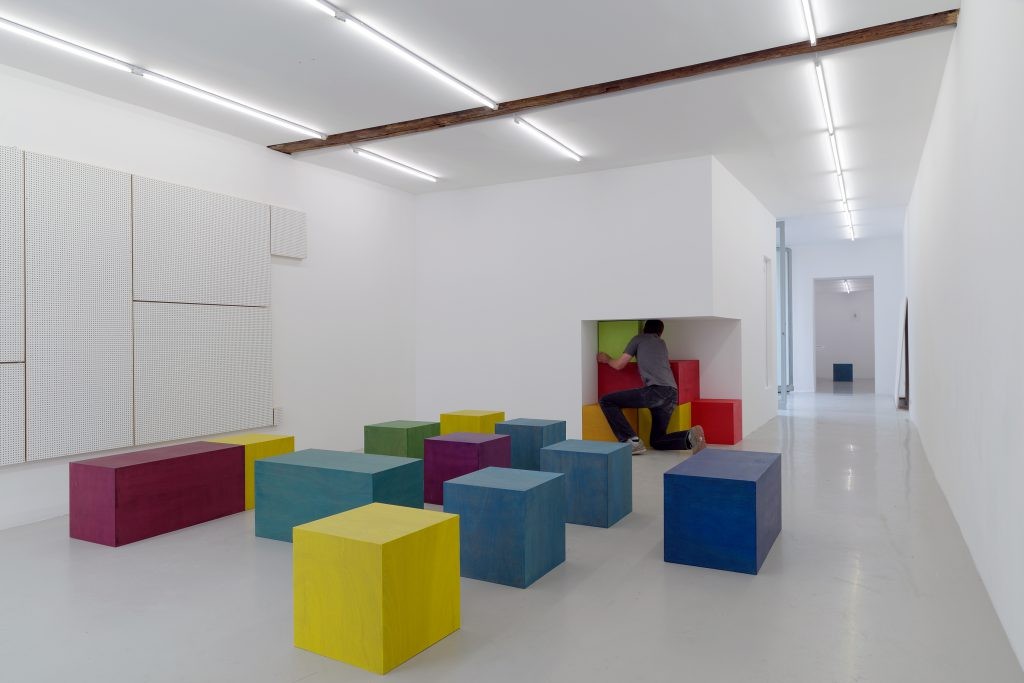Nicolás Paris
28 Sep - 08 Dec 2013
NICOLÁS PARIS
Room for us
28 September – 08 December 2013
The artist Nicolás Paris (b. 1977) works to create collective spaces of exchange that can generate different types of aesthetic and social experiences.
For his residency in Paris, the artist transforms Kadist Art Foundation into a temporary school or a place for learning and exchange. Inspired by the so-called “Garage Universities” in Latin America, the workshops bring together a wide range of participants across many disciplines and seek to redefine the functions traditionally fulfilled by an art institution. For this project, the artist combines the pedagogy of Fernand Deligny, the educational dynamics of the Compagnons du Devoir, the working methods of Joseph Jacotot, and the anarchist tactics used by the bakers’ association in Argentina in the beginning of the past century.
“Garage Universities” developed in Latin America due to a lack of accessible public or private universities. They became formal places dedicated to every kind of theoretical or practical learning. Living and working in Bogotá, Colombia, Nicolás Paris has watched entire neighborhoods be transformed by these complex shadow economies.
Nicolás Paris has long been interested in the use of drawing as a tool for learning. In the history of Latin American conceptualism, the use of language, drawing, and dematerialized participatory forms have often echoed certain pedagogical practices as a form of institutional critique and ways of rethinking the relation between knowledge and power. Aware of the social role of art, the artist analyzes the social structure in which the educational system is produced and makes art and pedagogy overstep their defined spaces. Combining his background as an artist with his experience as a schoolteacher and baker, Nicolás Paris hopes to encourage unexpected encounters and mutually evolving knowledge systems based on equality.
At Kadist, the series of workshops he conceived generates an barter economy where people exchange reflections and expertise rather than services and objects. For example, he will ask neighborhood bakers to create a shape, name, and recipe for an original type of bread in exchange for his own labor and baking expertise. He will introduce schoolchildren to his archive of drawing exercises and methodology in exchange for French lessons. Other workshops will engage architects and musicians.
Situated in a modular architecture inside the Foundation that the artist has specially designed, this exhibition is a way to consider how we live together. Unlike a “Garage University” where the curriculum is motivated by professional opportunities, the project by Nicolás Paris is led by loose association of ideas.
Room for us
28 September – 08 December 2013
The artist Nicolás Paris (b. 1977) works to create collective spaces of exchange that can generate different types of aesthetic and social experiences.
For his residency in Paris, the artist transforms Kadist Art Foundation into a temporary school or a place for learning and exchange. Inspired by the so-called “Garage Universities” in Latin America, the workshops bring together a wide range of participants across many disciplines and seek to redefine the functions traditionally fulfilled by an art institution. For this project, the artist combines the pedagogy of Fernand Deligny, the educational dynamics of the Compagnons du Devoir, the working methods of Joseph Jacotot, and the anarchist tactics used by the bakers’ association in Argentina in the beginning of the past century.
“Garage Universities” developed in Latin America due to a lack of accessible public or private universities. They became formal places dedicated to every kind of theoretical or practical learning. Living and working in Bogotá, Colombia, Nicolás Paris has watched entire neighborhoods be transformed by these complex shadow economies.
Nicolás Paris has long been interested in the use of drawing as a tool for learning. In the history of Latin American conceptualism, the use of language, drawing, and dematerialized participatory forms have often echoed certain pedagogical practices as a form of institutional critique and ways of rethinking the relation between knowledge and power. Aware of the social role of art, the artist analyzes the social structure in which the educational system is produced and makes art and pedagogy overstep their defined spaces. Combining his background as an artist with his experience as a schoolteacher and baker, Nicolás Paris hopes to encourage unexpected encounters and mutually evolving knowledge systems based on equality.
At Kadist, the series of workshops he conceived generates an barter economy where people exchange reflections and expertise rather than services and objects. For example, he will ask neighborhood bakers to create a shape, name, and recipe for an original type of bread in exchange for his own labor and baking expertise. He will introduce schoolchildren to his archive of drawing exercises and methodology in exchange for French lessons. Other workshops will engage architects and musicians.
Situated in a modular architecture inside the Foundation that the artist has specially designed, this exhibition is a way to consider how we live together. Unlike a “Garage University” where the curriculum is motivated by professional opportunities, the project by Nicolás Paris is led by loose association of ideas.

